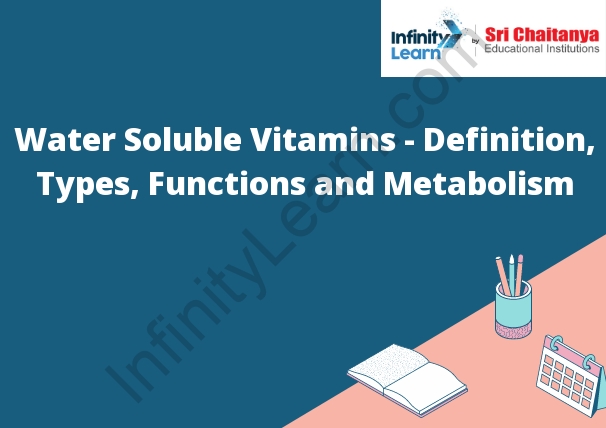Table of Contents
What are Vitamins?
Water Soluble Vitamins – Definition: There are 13 vitamins required by the human body. Vitamins are organic molecules that the body cannot produce on its own, and must be obtained from food. They are essential for many biochemical processes, including the regulation of energy metabolism, synthesis of DNA and RNA, and cell signaling.

Water-Soluble Vitamins
- Water-soluble vitamins dissolve in water and are generally excreted in urine. The body cannot store these vitamins, so they must be consumed regularly.
- Examples of water-soluble vitamins include the B vitamins and vitamin C.
Water-Soluble Vitamins Functions
- Water-soluble vitamins dissolve in water and are easily transported in the blood. The body cannot store them, so they must be consumed regularly. The water-soluble vitamins are vitamin C (ascorbic acid) and the B vitamins (thiamin, riboflavin, niacin, pantothenic acid, pyridoxine, biotin, and folate).
- The water-soluble vitamins have a variety of functions. Vitamin C is important for the growth and repair of tissues, for the production of collagen, and for the absorption of iron. The B vitamins are essential for the metabolism of carbohydrates, proteins, and fats. They are also involved in the production of energy and the maintenance of healthy skin, hair, and nails.
Effect of Water-Soluble Vitamins
-
- Water-soluble vitamins dissolve in water and are easily absorbed from the intestine into the bloodstream. They are transported around the body in the blood and are not stored in the body in any significant amount. This means that the body needs a continuous supply of water-soluble vitamins from the diet.
- Water-soluble vitamins include the B vitamins and vitamin C. The B vitamins are important for energy production, cell growth, and the maintenance of the nervous system. Vitamin C is important for the immune system, wound healing, and the prevention of infection.
Metabolism through Water Soluble Vitamins
- Metabolism is the process by which the body breaks down food into energy and uses it to carry out its daily functions. This process is essential for the body to function properly and maintain good health. The body breaks down food into molecules that it can use, including glucose, amino acids, and fatty acids. These molecules are then used to build new cells, to fuel the body’s activities, and to provide the body with the nutrients it needs.
- Water soluble vitamins are essential for the body to carry out its metabolic processes. These vitamins include the B vitamins and vitamin C. The B vitamins are important for energy production, and vitamin C is necessary for the body to make new cells. These vitamins are dissolved in water and are therefore easily absorbed by the body. They are also eliminated from the body in urine, so it is important to ensure that you are getting enough of these vitamins each day.






